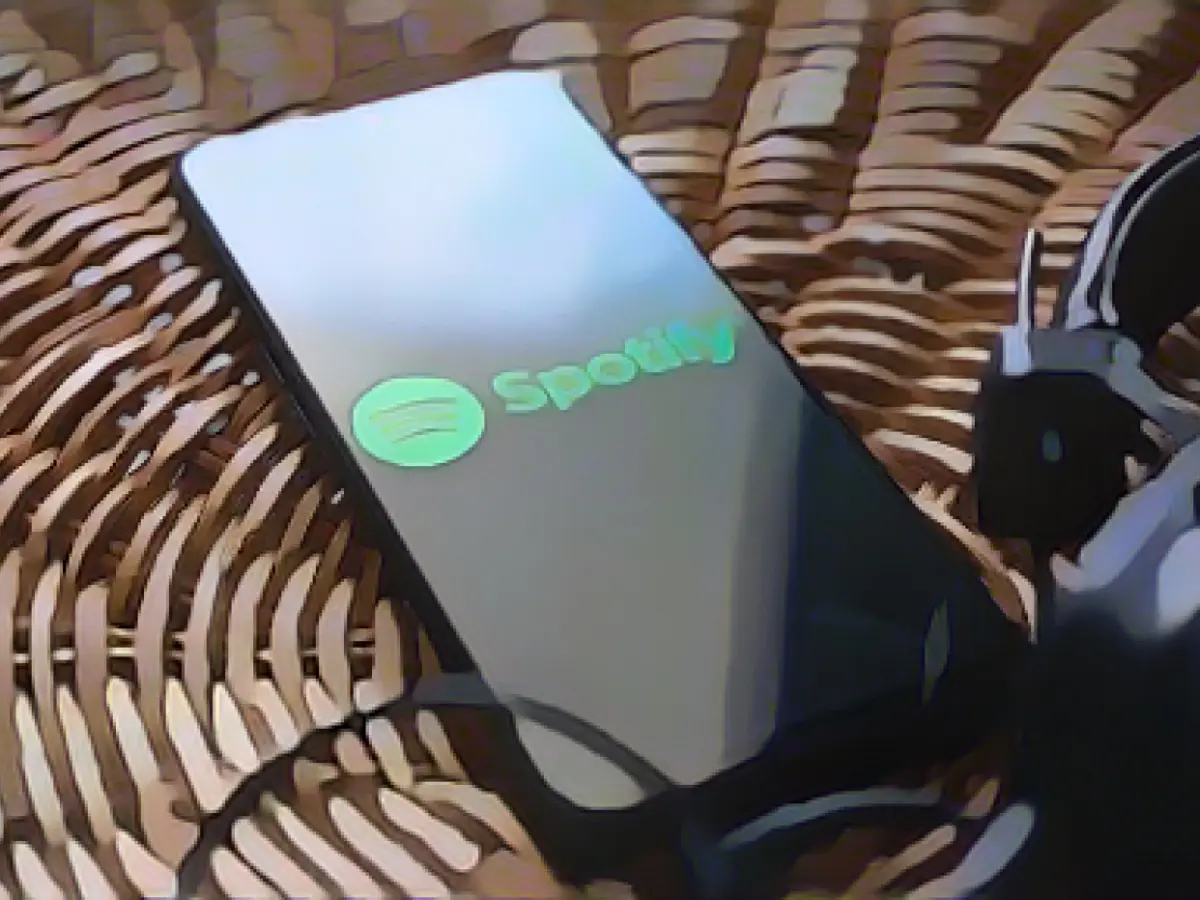Spotify's mass job cuts aim to push forward into AI technology - and Wall Street approves
After three rounds of layoffs within a year: 590 jobs in January, 200 jobs in June and another 1,500 this week, Spotify's investment into artificial intelligence targets boosting the profit margins of their podcast and audiobook divisions. This downsizing leaves an impression that Wall Street is optimistic about the success of their strategic revamp.
Justin Patterson, equity analyst at KeyBanc Capital Markets, commented in a research note, "Spotify utilizes AI on its platform and introduces AI DJs in 50 additional markets to mimic traditional radio experiences." He also mentioned "AI speech translation for podcasts" and "exploration of audiobooks for premium subscribers." Patterson believes Spotify has numerous opportunities to boost engagement and, eventually, profitability.
Spotify Technology S.A.'s shares have skyrocketed over 30% in the past six months and over 135% since the start of the year.
The company joins other tech firms in escalating expenditures, as the demand in the pandemic era lags. Furthermore, Spotify must recoup over a billion US dollars they spent on podcasts, with a significant portion going to collaborations with prominent figures for unrealized podcast production and acquisitions of podcast studios that were later shut down.
"Economic growth has drastically slowed, and capital is costlier," wrote Ek in an employee email, published on the company's website.
Jump on the AI bandwagon
In November 2022, Spotify announced a partnership with Google Cloud to rework the way podcast and audiobook recommendations are generated using Vertex AI Search, a speech model from Google Cloud.
Large speech models, such as ChatGPT, are computer programs that learn from vast datasets to offer human-like text and information based on what they "know."
Spotify launched "AI DJ" in February, introducing speech translation for selected episodes of English-speaking podcasts into Spanish, French, and German using Opens AI's "Whisper" speech translation tool.
A Spotify spokesperson told CNN that the company plans to expand these technologies in the future, dependent on developer and user feedback. They also pointed out some comments Ek made during the third-quarter earnings call, where the word "efficiency" was used over 20 times.
"The main takeaway from these (AI-) initiatives should be that they foster greater engagement, and greater engagement means we can reduce churn," Ek said during Spotify's earnings call in October. "Higher engagement also means we create more value for consumers." This improved price-quality ratio enabled them to raise prices successfully during the last quarter.
Douglas Anmuth, head of Internet Equity Analyst at J.P. Morgan, noted in a research note that investing in podcasts, in addition to artist marketing, has long-term potential to drive engagement.
How does personalization work?
Spotify has offered hyper-personalized experiences to users for approximately a decade. In 2014, Spotify acquired The Echo Nest Corp and blended machine learning and natural language processing to add a personal touch.
The Spotify technology builds a database of songs and artists by identifying musical tones and rhythms and linking artistic work with a shared cultural context.
Metadata like the release date, play duration, loudness, and the likelihood that a song will get people dancing aid in determining which songs align with a user's taste.
From this foundation, Daily Mix and Weekly Discoveries were born. "Time Capsule" and "Replay" playlists collect the most popular songs of a user and enable continued engagement with songs they've listened to or discover old favorites.
Anil Jain, global president for strategic consumer industries at Google Cloud, told CNN via email that Vertex AI Search enables media and entertainment companies to build content discovery features for video, audio, images, and text. He declined to comment on the terms of the deal with Spotify.
Vertex AI Search takes into account several factors to make content recommendations for users, such as real-time user behavior, content similarity, and content relevance for the user's search.
Challenges and Opportunities
Reece Hayden, leading analyst at ABI Research, believes large speech models (LLMs) could increase engagement on the Spotify platform.
"Large-scale speech models can improve personalization, enhance recommendations, and ensure that recommendations better reflect users’ interests, as they understand whole texts/video rather than relying on keywords/metadata," Hayden told CNN via email.
He added that LLMs differ from "fundamental prediction models" that rely on keywords/metadata by understanding podcasts and interpreting them to see if they align with user interests and gain a deeper understanding of user preferences for recommendation.
However, there is a price to pay.
"Operating an LLM to understand all podcasts/audiobooks is resource-intensive and can offer a limited value advantage compared to simple prediction models … LLMs come with additional challenges in terms of data privacy and cost/resources. It will be enormous," Hayden said.
He expressed optimism about Whisper's potential in podcast translation, although he acknowledged that generative AI may make errors in the form of incorrect sentences or phrases during the learning process.
"Considering the availability of data points, various speech translation models like Whisper will quickly improve and ensure high accuracy," Hayden said. "The disadvantage of Whisper lies in its core function, which is translating from other languages into English … most podcasts are recorded in English, making it not generally effective."

"Read also:"
Spotify commences expanding its offerings with speech functions and numerous other AI features to boost podcast and audiobook quality and enhance user experience. This allows the platform to maintain profitability at significantly higher prices.
Their AI-driven investment aims to improve content placement predictions for employees and audiences, identifying which audiobooks and podcasts best suit their tastes.
Source:
Enrichment Data:
Spotify leverages AI in several ways to enhance its podcast and audiobook offerings and boost its profitability:
- AI-Narrated Audiobooks:
- Partnering with ElevenLabs: Spotify has partnered with ElevenLabs to introduce AI-narrated audiobooks in 32 languages, making content creation more accessible and affordable for authors.
- Personalization and Content Discovery:
- AI-Driven Features: Spotify is using AI to enhance personalization and content discovery, including features like personalized playlists and deeper personalization of user experiences.
- Content Moderation:
- AI in Moderation: AI is being used to make features like podcast comments economically viable, reducing moderation costs.
- Monetization Strategies:
- Tiered Pricing Models: Spotify is experimenting with tiered pricing models and bundled offerings, allowing it to capture more value from its user base while maintaining competitiveness in price-sensitive markets.
- Enhancing User Experience:
- AI in User Experience: AI is being used to improve user experience beyond mere recommendation, such as creating sophisticated conversion funnels for super fan offerings.
By integrating AI in these areas, Spotify aims to improve its podcast and audiobook offerings, boost user engagement, reduce costs, and increase profitability.








